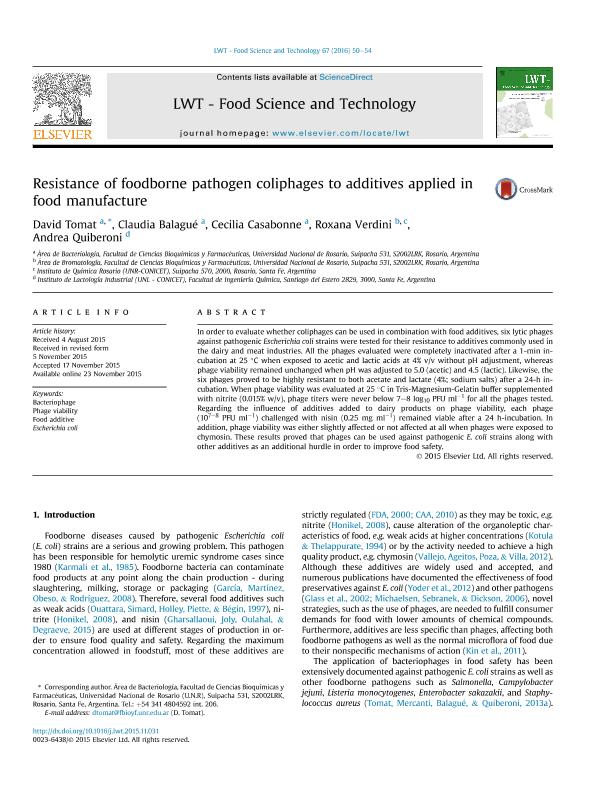Artículo
Resistance of foodborne pathogen coliphages to additives applied in food manufacture
Tomat, David Damian ; Balague, Claudia Elisabeht; Casabonne, Cecilia; Verdini, Roxana Andrea
; Balague, Claudia Elisabeht; Casabonne, Cecilia; Verdini, Roxana Andrea ; Quiberoni, Andrea del Lujan
; Quiberoni, Andrea del Lujan
 ; Balague, Claudia Elisabeht; Casabonne, Cecilia; Verdini, Roxana Andrea
; Balague, Claudia Elisabeht; Casabonne, Cecilia; Verdini, Roxana Andrea ; Quiberoni, Andrea del Lujan
; Quiberoni, Andrea del Lujan
Fecha de publicación:
04/2016
Editorial:
Elsevier Science
Revista:
LWT - Food Science and Technology
ISSN:
0023-6438
Idioma:
Inglés
Tipo de recurso:
Artículo publicado
Clasificación temática:
Resumen
In order to evaluate whether coliphages can be used in combination with food additives, six lytic phages against pathogenic Escherichia coli strains were tested for their resistance to additives commonly used in the dairy and meat industries. All the phages evaluated were completely inactivated after a 1-min incubation at 25 °C when exposed to acetic and lactic acids at 4% v/v without pH adjustment, whereas phage viability remained unchanged when pH was adjusted to 5.0 (acetic) and 4.5 (lactic). Likewise, the six phages proved to be highly resistant to both acetate and lactate (4%; sodium salts) after a 24-h incubation. When phage viability was evaluated at 25 °C in Tris-Magnesium-Gelatin buffer supplemented with nitrite (0.015% w/v), phage titers were never below 7-8 log10 PFU ml-1 for all the phages tested. Regarding the influence of additives added to dairy products on phage viability, each phage (107-8 PFU ml-1) challenged with nisin (0.25 mg ml-1) remained viable after a 24 h-incubation. In addition, phage viability was either slightly affected or not affected at all when phages were exposed to chymosin. These results proved that phages can be used against pathogenic E. coli strains along with other additives as an additional hurdle in order to improve food safety.
Palabras clave:
BACTERIOPHAGE
,
ESCHERICHIA COLI
,
FOOD ADDITIVE
,
PHAGE VIABILITY
Archivos asociados
Licencia
Identificadores
Colecciones
Articulos(IQUIR)
Articulos de INST.DE QUIMICA ROSARIO
Articulos de INST.DE QUIMICA ROSARIO
Citación
Tomat, David Damian; Balague, Claudia Elisabeht; Casabonne, Cecilia; Verdini, Roxana Andrea; Quiberoni, Andrea del Lujan; Resistance of foodborne pathogen coliphages to additives applied in food manufacture; Elsevier Science; LWT - Food Science and Technology; 67; 4-2016; 50-54
Compartir
Altmétricas



